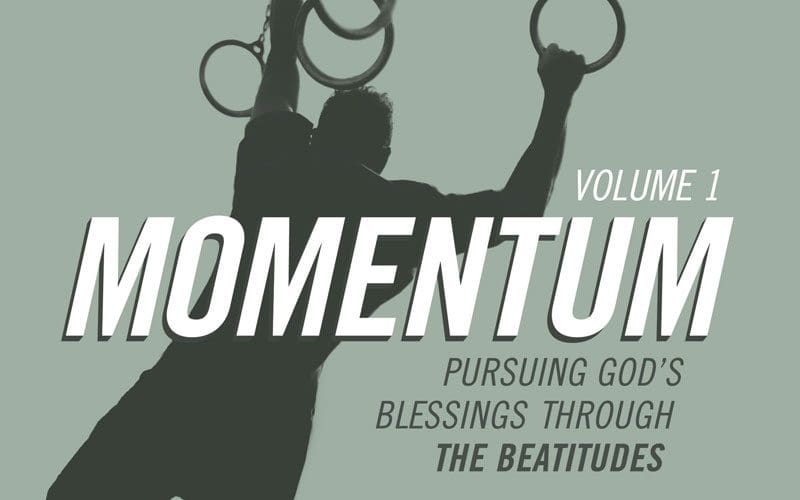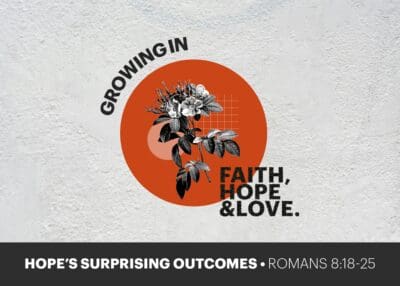“Blessed are those who mourn, for they shall be comforted.” Matthew 5:4
Don’t miss the word “blessing,” that is repeated here, and over and over, in the Beatitudes. In the Old Testament God’s people gathered at Mount Sinai. God came down, but His face was never seen. The people were kept at a distance. Darkness descended. Fire and smoke covered the mountain. The trumpets were blasting (Deuteronomy 4:11-12).
The whole scene was so terrifying that even Moses said, “I am trembling with fear” (Hebrews 12:21). If that’s how Moses felt, how do you think you or I would have felt?
But when we come to the Beatitudes, the scene is completely different. God has come among us in the person of Jesus Christ. We see His face. He bids us to come to him.
At Mount Sinai, God comes down to the mountain in terrifying splendor, and the people are kept at a distance. But here the Son of God goes “up on the mountain (Matthew 5:1), and when He sits down, His disciples come to Him.
At Sinai, God spoke thundering words, so terrifying that the people begged that no further words would be spoken (Hebrews 12:19). But here the Son of God speaks, not thundering words of condemnation, but wonderful words of blessing. Who would not want to draw up a chair and listen to God in the flesh tell us about the life that is truly blessed.
We have seen that Christ begins with this astonishing statement: “Blessed are the poor in spirit for theirs is the kingdom of heaven” (Matthew 5:3). We saw last time that, Christians are people who know their own poverty. They look to Jesus for what they do not have, and know that in Him they have everything they need.
Aren’t you glad that the first Beatitude is: Blessed are the poor in spirit? If being pure in heart was the starting point, none of us would ever get there. That’s beyond us. But Christ comes near to us. Thank God that the starting point is to recognize that we do not have what it takes. Spurgeon says…
A ladder, if it to be of any use, must have its first step near the ground… This Gospel blessing reaches down to the very spot where the law leaves us.[1]
The law will bring you to a place called “poor in spirit” and Jesus will meet you there: “Blessed are the poor in Spirit for theirs is the kingdom of heaven.” Today we move on to the second Beatitude: “Blessed are those who mourn, for they shall be comforted” (Matthew 5:4).
Three Kinds of Mourning
“Blessed are those who mourn…” Matthew 5:4
What is this mourning that Jesus says is blessed without qualification? There are three kinds of mourning—natural, sinful, and spiritual.
Natural mourning is grieving for someone you have lost
God gave you a wonderful gift, and now that gift has been taken away. The natural response is to mourn. Those who’ve been bereaved know about this. Jesus knew about this. He wept at the graveside of a friend.
The presence and comfort of Jesus in the journey of bereavement is a treasured gift to every believer, but that’s not what Jesus is speaking about here. Here’s why… in the Beatitudes, Jesus is speaking about qualities we are to proactively pursue. We are to go after purity of heart. We are to seek righteousness. We are to desire meekness.
We are to get as much of these things that we possibly can. Jesus is speaking about conditions of heart that are so laden with blessing, and He is encouraging us to go after them at any cost.
That is true of all seven Beatitudes, and the eighth that is added (being persecuted for righteousness sake), is simply the outcome of a life marked by the other seven. We are to desire and to go after as much of these blessed qualities as we can get.
Nobody would say that about natural mourning. No bereaved person would say, “I want to go after as much of that as I can possibly get.” So that is not what Jesus is speaking about here.
Sinful mourning is pining for something God has not given
Godly grief produces a repentance that leads to salvation without regret, whereas worldly grief produces death. 2 Corinthians 7:10
There is no sin in natural mourning. Jesus wept. Grieving over something or someone God has taken away is modeled by Christ. But there are other kinds of sorrow. Paul warns us about a worldly sorrow that leads to death.
This sinful mourning is pining for what God has not given.
You have an example of this in Ahab, the king of Israel. God gave him a palace and a kingdom, but next to the palace, there was a poor man called Naboth who had a vineyard. Ahab set his eyes on Naboth’s vineyard. The Bible says Ahab became “vexed and sullen.” We might say today that he’s “pouting.” Why? Because he could not get his hands on the vineyard.
Another word for it is “coveting,” and it led to the murder of Naboth. Coveting is pining for what God has given to others, but He has not given to us. This sinful mourning is a killer. It leads to death and obviously that is not what Jesus is speaking about here when he says “Blessed are those who mourn for they shall be comforted.”
Spiritual mourning is sorrow over our sins against God
A. W. Pink says,
The mourning for which Christ promises Divine comfort is a sorrowing over our sins with a godly sorrow. [2]
This is the godly sorrow Paul speaks about in 2 Corinthians 7:10. It is blessed because it “produces a repentance that leads to life.” You know about natural sorrow. You may know about sinful sorrow. What do you know about godly sorrow, this mourning that is blessed?
This subject is of huge importance to the church today, because true Christians are surrounded by a form of faith that has been so emaciated, so diluted, that it’s unrecognizably different from what Jesus speaks about.
Thank God for the marvelous truth that we are justified by faith: “Since we have been justified by faith, we have peace with God through our Lord Jesus Christ” (Romans 5:1). Why does faith justify? Why does faith justify and not works?
A believer is justified by faith because faith unites a person to Jesus Christ, who justifies, sanctifies and glorifies believers through the power of His shed blood. This power is applied to the life of the believer by the presence and power of the Holy Spirit.
The Trivialization of What is Called “Christianity” In Our Time
Faith, which unites a person to Christ, has been reduced to belief,
an assent to certain truths
Simply believing certain things will never change your life, as if believing what the devil, himself, knows to be true would change you. No, Jesus Christ changes you!
Faith is the bond of a living union with Christ. And when Christ enters a life, He comes to forgive you and to make you holy. He accepts you as you are, but His grace will never leave you as you are.
The replacement of faith, which unites a person to Christ, with mere assent to certain truths, leads thousands of people to “accept Christ” without ever bowing to His Lordship in their lives. We end up with a form of faith that does not change our lives. The world despises this, and it is right to do so.
Repentance, which involves a change of direction, has been reduced to merely admitting that I am a sinner and saying a prayer
Listen to Scripture, and try to take in how far the Bible is from the kind of message that often poses under the banner of Christianity today. Here’s the biblical call to repentance:
Seek the Lord while he may be found; call upon him while he is near. Let the wicked forsake his way and the unrighteous man his thoughts; let him return to the Lord, that he may have compassion on him and to our God for he will abundantly pardon. Isaiah 55:6-7
God says to the wicked “Forsake your way. Stop doing what you are doing. Turn!” That’s a million miles away from admitting I’m a sinner and continuing on with my ways. Or listen to this from the New Testament:
God’s foundation stands firm, bearing this seal: “The Lord knows who are his” and “Let everyone who names the name of the Lord depart from iniquity.” 2 Timothy 2:19
If you are going to name the name of the Lord, here’s what it means: “Depart from iniquity!” The call of God to repentance, which involves a change in direction, has been replaced by “admitting you are a sinner,” and “asking Jesus to forgive you.”
I remember as a 17-year-old, hearing Alan Redpath, a seasoned preacher, near the end of his life:
God has not promised to forgive one sin that you are not willing to forsake.[3]
Union with Christ that humbles the sinner and leads to a holy life has been replaced by an emaciated form of faith that can easily be added to the American dream. Faith has been redefined to accommodate our intransigence. Repentance has been reshaped to fit our indulgence. Most of us have been immersed in this emaciated faith all our lives.
A. W. Tozer lamented this half a century ago, in a book written right here in the city of Chicago:
The whole transaction of religious conversion has been made mechanical and spiritless. Faith may now be exercised without a jar to the moral life and without embarrassment to the Adamic ego. Christ may be “received” without creating any special love for him in the soul of the receiver. The man is “saved” but he is not hungry or thirsty after God. [4]
The result is that you have people by the thousands who “admit that they are sinners” and “accept Jesus,” but who have not experienced spiritual life at all. How would that be known?
The evidence of this is that they don’t feel poor in spirit, they don’t know what it is to mourn over sin. They aren’t characterized by a deep hunger for righteousness. They aren’t merciful. They aren’t pure in heart.
They do not know, even in the gathering for worship, the joy and the blessing of a person who has discovered that in Christ they have all that they need. This theme of spiritual mourning is of critical importance to the whole church in our time. It’s a message that all of us need to hear.
What Does Spiritual Mourning Look Like?
DISTINGUISHING MARKS OF SPIRITUAL MOURNING:
Spiritual mourning arises from humility
Spiritual mourning follows naturally from becoming poor in spirit. When you see that you do not have what it takes, you will mourn over the sins that are yours, and mourn over the righteousness that you do not have.
We’ve been picturing the Beatitudes as a series of seven rings. Swinging on that first ring of being poor in spirit will lead you to the second ring of the mourning that is blessed.
You swing on the first and it will get you to the second and so on. You can’t begin on the second ring. You can’t suddenly mourn over what used to bring you joy.
Every sin holds a passing pleasure, that’s why sin tempts us. Nobody would sin if this weren’t true. So how can you learn to hate what you used to love and love what you used to hate? You have to start on the first ring.
DISTINGUISHING MARKS OF SPIRITUAL MOURNING:
Spiritual mourning is a matter of the heart
You might not be able to tell the difference between spiritual mourning and natural mourning in another person, but you can tell the difference in your own heart.
The Bible tells us the story of Saul, a high achiever with a twisted heart. Saul was the first King of Israel. He led his army into battle and then took plunder for himself and for his men. He cheated, deceived and stole, and then he lied to cover it up. But later he was found out. Samuel confronted him with the truth, and Saul had nowhere to hide.
So Saul confessed. He said he was sorry. He said to Samuel, “I have sinned, for I have transgressed the commandment of the Lord” (1 Kings 15:24). I’m sure he had a very long face when he said it. Then he says something else to Samuel, “I have sinned, yet honor me now before the elders of my people” (1 Kings 15:30).
He appears sorry, but the truth is that he would have continued what he was doing, if he could. He says he is sorry but his focus is on damage limitation. There has not been a change of heart.
Spiritual mourning is the key to tackling what we call “habitual sins,” sins that keep recurring in a person’s life. A true Christian does not live in a cycle of sinning, saying sorry to God and then repeating the same behavior, year after year after year…
Why do we know so much of habitual sin? Because we know so little about mourning. God’s kindness is meant to lead us to repentance, not to presumption.
Here is a person who is content to sin and assume forgiveness but does not mourn, and does not change. That is not walking the path of repentance. That is walking the path of presumption. God announces mercy for mourners. Those who are not mourners have nothing to do with mercy.
Alexander Maclaren says:
If you have never been down on your knees before God, feeling what a wicked man or woman you are, I doubt hugely whether you will ever stand with radiant face before God, and praise Him through eternity for His mercy to you. [5]
Spiritual mourning is infused with hope
Judas grieved over his sin in betraying Jesus, but he did not have spiritual mourning, why? His grief led him to despair. Grief that leads to despair is the work of Satan, not the Holy Spirit.
Satan brings you to despair of self, but he never brings you to hope in Christ. The Holy Spirit brings you to despair of self and to hope in Christ. That’s how you tell the difference between what the devil is trying to do in your life, and what the Holy Spirit is doing in your life. Hope is a signature mark of spiritual mourning.
That’s why the true Christian is in Paul’s words, “sorrowful yet always rejoicing” (2 Corinthians 6:10). It’s very fascinating that those two things go together.
There are two sides to the coin on genuine Christian experience. The true Christian says, “Who is sufficient for these things?” But his mourning is infused with hope, so he does not stop there. He says, “Our sufficiency is of God.”
The true Christian continues to say, “O wretched man that I am,” but he doesn’t end there. His mourning is infused with hope, so he says, “Thanks be to God who has given me the victory through Jesus Christ our Lord.”
The true Christian says with Paul, “I am the chief of sinners.” But she does not end there. Her mourning is infused with hope and she says, “By the grace of God I am what I am.”
True Christians mourns their sins. But they never end there. Our mourning is infused with hope, and so we lay hold of the comfort that is in Christ. Without that it’s not spiritual mourning, it’s just the devil trying to make you despair.
The Blessing That Those Who Mourn Will Receive
“Blessed are those who mourn for they shall be comforted.” Matthew 5:4
How will they be comforted? What in all the world can comfort people who feel the weight of their own sin? A better question would be: Who can comfort people who feel the weight of their own sin?
Those who mourn find a friend in the “Man of sorrows”
The Savior who spoke these words was known as the “man of sorrows.” The prophet Isaiah announced that the Redeemer would be “a man of sorrows” and “acquainted with grief” (Isaiah 53:3) centuries before He was born.
Christ knows all about spiritual mourning, not because He mourned over his own sins. He had no sins to mourn. But He mourned over the sins of the world, and grieved over their devastating effect. See Him mourning over Jerusalem—coming down the Mount of Olives, He weeps over a city that rejects Him and is headed for destruction.
The mission of the Redeemer is to comfort those who mourn
Writing years before the birth of Christ, Isaiah spoke of what the Redeemer would do when He came. Why did He come into the world?
His mission is to “comfort all who mourn… to bestow on them a crown of beauty instead of ashes, the oil of gladness instead of mourning, and a garment of praise instead of a spirit of despair” (Isaiah 61:2-3 NIV)
Christ accomplished His mission by bearing our sins…
…and carrying our sorrows
Surely he has borne our griefs and carried our sorrows… He was pierced for our transgressions; He was crushed for our iniquities. The Lord has laid on Him the iniquity of us all. Isaiah 53:3, 5-6
The Holy Spirit comforts the person who mourns…
…by making what Christ purchased yours
There is a beautiful verse in 1 Corinthians 6. In it, Paul lists a catalogue of sins: Some of you were drunkards, revelers, swindlers, idolaters, adulterers… That’s what you were, “but you were washed, you were sanctified, you were justified in the name of the Lord Jesus Christ and by the Spirit of our God” (1 Corinthians 6:11).
In Christ, the spiritual mourner can say, “I am forgiven! I am cleansed! I have been washed. I am justified before God. I’m not the person I want to be, but I’m not the person I used to be. Sanctification has begun in me, and one day it will be complete—all because of the Lord Jesus Christ and through the Holy Spirit.” That’s the comfort for those who mourn!
That’s why the true Christian is “sorrowful yet always rejoicing” (2 Corinthians 6:10). What do you know of this in your life?
[1] C.H. Spurgeon, from sermon #3156, “The First Beatitude,” 1873
https://spurgeongems.org/vols55-57/chs3156.pdf
[2] A. W. Pink, “The Beatitudes,” p. 15, Over the Hill pub., 2011
[3] For more on Alan Redpath, see: https://www2.wheaton.edu/bgc/archives/GUIDES/238.htm
[4] A. W. Tozer, “The Pursuit of God,” p. 2, Christian pub., 1982
[5] Alexander Maclaren, “The Beatitudes and Other Sermons,” optimized for Kindle, 2012





